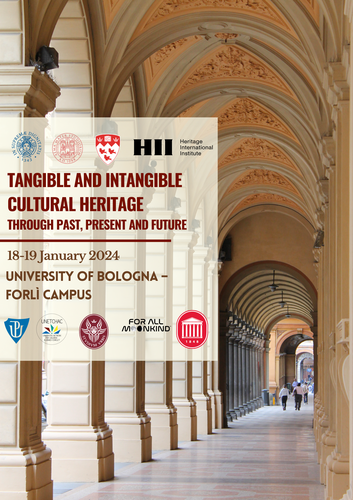University of Bologna, McGill University and University of Pisa, in collaboration with Sapienza University of Rome, University of Mississippi, Palacký University Olomouc and Universities Network for Children and Armed Conflicts, are pleased to announce the third edition of the International Symposium on Cultural Heritage in War and Peace: Tangible and Intangible Cultural Heritage through Past, Present and Future.
This theme invites participants to look in greater depth at the very notion of cultural heritage. It proposes to focus on diverse aspects of heritage protection in conflict and peace, conceptualize more critically the notion of tangibility and intangibility, address heritage issues beyond planet Earth and put forward innovative ways to deal with heritage preservation and management.
Particular attention will also be devoted to the innovative management of cultural heritage from the point of view of accessibility and inclusive education for vulnerable groups. Cultural heritage, indeed, should be an irreplaceable source of knowledge, growth, identity, enjoyment and care for everyone.
Intangible cultural heritage, in the 20th anniversary of its Convention, currently faces many challenges, such as cultural globalization, economic pressure, and loss of territories and languages. It also lacks specific protection during armed conflicts, unlike tangible cultural heritage, which is safeguarded by the Convention for the Protection of Cultural Property in the Event of Armed Conflict (1954) and its Optional Protocols.
On the other hand, tangible cultural heritage faces risks from climate change, desertification, and natural disasters worldwide. Ongoing wars escalate the danger for cultural sites, including those registered in the UNESCO lists, and sometimes lead to destruction, looting, and illicit trafficking of heritage objects, thus disrupting social cohesion and communities' practices and identity.
On a different note, it should be emphasized that human activity on celestial bodies is increasingly recognized as common human heritage that needs to be protected.
The protection of cultural heritage requires collaboration between experts and local communities, both in times of peace and armed conflict, to ensure the retention of valuable knowledge acquired from the discovery, study, exploration and conservation of heritage. Unfortunately, this information is often at risk due to the lack of systematic preservation and an excessive reliance on individual experts.
The Heritage International Istitute (HII), which will be presented during the Symposium, gathers leading global experts on heritage, from all regions of the world, with a view to deal with these challenges and protect and promote tangible and intangible cultural and natural heritage, all over the world and under every circumstances, including during armed conflicts. By exploring innovative approaches and promoting policy responses for more effective protection of heritage, both in times of war and peace, the Heritage International Institute will contribute to guarantee peace and international security, human right and sustainable development and to build cultural bridges between countries and people.
In the belief that digital language can be a fundamental tool for promoting the importance of cultural heritage and providing a further possibility of conservation, the International Symposium will also host the Virtual Museum on Cultural Heritage, promoted by the Italian Ministry of Foreign Affairs and International Cooperation together with the Italian Ministry of Culture. The Virtual Museum is the first initiative at a global level on such an important topic, offering an example of digital interpretative exegesis of cultural heritage that combine different digitization models. The Museum project is headed by its Artistic Director Sergio Iovino and its Curator Giulia Parenti.
Considering the above, we present the third edition of the Symposium in the hope of exploring innovative approaches to the issues at stake and promoting policy responses for more effective protection of tangible and intangible heritage, both in times of war and peace, in order to pursue the full enjoyment of cultural rights and sustainable development.
HOW TO PARTICIPATE
The Symposium will be held in Aula 3 (high level sessions) and Aula 2 (parallel sessions) of the Teaching Hub. Those wishing to attend may register at the registration desk located at the infopoint of the Teaching Hub in Forlì.
PRESS (ITA)
Sono previsti degli accrediti speciali per la stampa alla registrazione delle 8.30 del 18 gennaio (vedi agenda) presso l’Infopoint del Teaching Hub del Campus di Forlì. Nello specifico per i membri della stampa che vorranno partecipare al primo e al secondo giorno del Simposio, gli accrediti varranno per ogni attività prevista dall’agenda (visita speciale al Museo Virtuale, visita speciale a Palazzo Romagnoli, cena del primo giorno, il secondo giorno alla Rocca di Bertinoro, inclusa la cena finale). Allo stesso modo, per chi volesse partecipare solo il secondo giorno, ci sarà un accredito speciale per la giornata al Castello di Bertinoro, includendo anche la cena finale. In tal caso, gli accreditati solo per il secondo giorno, qualora volessero usufruire di trasporto, dovranno farlo sapere non appena possibile al seguente indirizzo email: giulia.parenti10@unibo.it

News:
Participants will include the Undersecretary of State at the Ministry of Culture, Lucia Borgonzoni; the Undersecretary of State for Foreign Affairs and International Cooperation, Maria Tripodi; Embassy Counsellor Paolo Bartorelli, Head of the UNESCO Office at MAECI; Legation Counsellor Stefano Crescenzi, in charge of UN affairs for the General Directorate for Political and Security Affairs at MAECI; and the Director of the Italian Cultural Institute in Cairo, Davide Scalmani.
Among others, the Permanent Representative of Italy to UNESCO in Paris, Liborio Stellino; the Ambassador of Italy to Libya, Gianluca Alberini; and the Ambassador of Italy to Baghdad, Maurizio Greganti, will also intervene. More than 120 professors and experts from all over the world will take part in the event. Professor Giuseppe Nesi of the International Law Commission will also be present.